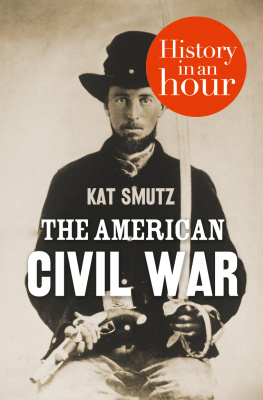Louis P. Masur - The Civil War: A Concise History
Here you can read online Louis P. Masur - The Civil War: A Concise History full text of the book (entire story) in english for free. Download pdf and epub, get meaning, cover and reviews about this ebook. City: New York, Oxford U.K.,, year: 2011, publisher: Oxford University Press, genre: Politics. Description of the work, (preface) as well as reviews are available. Best literature library LitArk.com created for fans of good reading and offers a wide selection of genres:
Romance novel
Science fiction
Adventure
Detective
Science
History
Home and family
Prose
Art
Politics
Computer
Non-fiction
Religion
Business
Children
Humor
Choose a favorite category and find really read worthwhile books. Enjoy immersion in the world of imagination, feel the emotions of the characters or learn something new for yourself, make an fascinating discovery.
- Book:The Civil War: A Concise History
- Author:
- Publisher:Oxford University Press
- Genre:
- Year:2011
- City:New York, Oxford U.K.,
- Rating:4 / 5
- Favourites:Add to favourites
- Your mark:
- 80
- 1
- 2
- 3
- 4
- 5
The Civil War: A Concise History: summary, description and annotation
We offer to read an annotation, description, summary or preface (depends on what the author of the book "The Civil War: A Concise History" wrote himself). If you haven't found the necessary information about the book — write in the comments, we will try to find it.
The Civil War: A Concise History — read online for free the complete book (whole text) full work
Below is the text of the book, divided by pages. System saving the place of the last page read, allows you to conveniently read the book "The Civil War: A Concise History" online for free, without having to search again every time where you left off. Put a bookmark, and you can go to the page where you finished reading at any time.
Font size:
Interval:
Bookmark:
THE CIVIL WAR
A CONCISE HISTORY
LOUIS P. MASUR


Oxford University Press, Inc., publishes works that further Oxford Universitys objective of excellence in research, scholarship, and education.
Oxford New York Auckland Cape Town Dar es Salaam Hong Kong Karachi Kuala Lumpur Madrid Melbourne Mexico City Nairobi New Delhi Shanghai Taipei Toronto
With offices in Argentina Austria Brazil Chile Czech Republic France Greece Guatemala Hungary Italy Japan Poland Portugal Singapore South Korea Switzerland Thailand Turkey Ukraine Vietnam
Copyright 2011 by Louis P. Masur
Published by Oxford University Press, Inc. 198 Madison Avenue, New York, NY 10016
www.oup.com
Oxford is a registered trademark of Oxford University Press
All rights reserved. No part of this publication may be reproduced, stored in a retrieval system, or transmitted, in any form or by any means, electronic, mechanical, photocopying, recording, or otherwise, without the prior permission of Oxford University Press.
Library of Congress Cataloging-in-Publication Data
Masur, Louis P.
The Civil War : a concise history / Louis P. Masur.
p. cm.
Includes bibliographical references and index.
ISBN 978-0-19-974048-2
1. United StatesHistoryCivil War, 18611865. I. Title.
E468.M155 2011
973.7dc22
2010019460
1 3 5 7 9 8 6 4 2
Printed in the United States of America
on acid-free paper
For my teachers and my students
Human-nature will not change. In any future great national trial, compared with the men of this, we shall have as weak, and as strong; as silly and as wise; as bad and good. Let us, therefore, study the incidents of this, as philosophy to learn wisdom from, and none of them as wrongs to be revenged.
Abraham Lincoln, November 10, 1864
The Secession war? Nay, let me call it the Union war. Though whatever calld, it is even yet too near ustoo vast and too closely overshadowingits branches unformd yet, (but certain,) shooting too far into the futureand the most indicative and mightiest of them yet ungrown.
Walt Whitman, Death of Abraham Lincoln, 1879
CHAPTER 1
The Origins of the Civil War
CHAPTER 2
1861
CHAPTER 3
1862
CHAPTER 4
1863
CHAPTER 5
1864
CHAPTER 6
1865 and After the War
On April 12, 1861, at around 4:30 in the morning, Confederate guns opened fire on Fort Sumter, situated in the harbor outside Charleston, South Carolina. A war began that lasted four years, claimed more than six hundred thousand lives, and forever transformed the nation.
The shooting may have started that day, but the conflicts origins came much earlier. Just when, of course, is impossible to say. Perhaps it was with the election of Abraham Lincoln, the first Republican president, a western lawyer and politician who came to office without any Southern support. Or perhaps it was with the bloodshed in Kansas in the mid-1850s, a rehearsal of sorts for the Civil War, which captured the nations attention and reopened with a vengeance the thorny issue of slave expansion into the territories. Or back farther, to the Compromise of 1850, which settled little, or the Mexican War of 184648, or the fears and actions of abolitionists and slaveholders who parsed every event through a conspiratorial lens. Or farther still: the Nullification Crisis, Nat Turners rebellion and the Virginia debate over abolishing slavery, or the Missouri Compromise. Looking back, some citizens contemplated the Constitution and blamed the framers for failing to resolve the tensions between state and nation, slavery and freedom. Sectional strain had all been building for a long time until, suddenly, the recurring threat of disunion became a stark reality.
Perhaps no event in American history has invited more speculation about whether it could have been avoided, or turned out differently, than the Civil War. It is an intriguing thought experiment to pose such questions as what if Lincoln had acquiesced on Southern secession, or what if a settlement guaranteeing slavery had been reached in the winter of 186061, or what if some general at any one of a half-dozen battles had managed to decimate the enemy army. But ultimately such what if questions tell us nothing about what was. As the narrator in Cormac McCarthys novel All the Pretty Horses observes, There is no one to tell us what might have been. We weep over the might have been, but there is no might have been. There never was.
This concise history seeks to explain what happened, how it transpired, and what it all meant. Causation is nearly as nettlesome a problem as contingency. In his masterpiece War and Peace, a draft of which he completed in 1863, Leo Tolstoy observed, It is beyond the power of the human intellect to encompass all the causes of any phenomenon. But the impulse to search into causes is inherent in mans very nature. One can no more know what caused an event as complex as the Civil War than whether it could have been avoided. This is not to say key factors cannot be isolated: Slavery caused the Civil War, but in what ways? Disagreements over questions of sovereignty and Constitutional authority caused the Civil War, but how? Northerners and Southerners saw themselves as different, but why did those differences turn lethal and ultimately lead to horrific violence?
Despite these difficulties, it is important to sketch the contours of the wars origins, and I do so by surveying its long-term origins, short-term origins, and triggering events. The focus here is on states rights and slavery and how the momentum of events led the nation to catastrophe. The story begins with the revolutionary era because the debates over the ratification of the Constitution, and the ways the delegates dealt with the issue of slavery, framed a disagreement that did not end. At times, the long lead-up to war may seem like a series of remotely connected acts, but these were more than prosaic events to be memorized only by schoolchildren. By 1860, decades of intensifying conflict over government authority with respect to the expansion of slavery swelled into the tsunami of secession.
The remainder of this volume is devoted to the war itself, its aims and methods, its costs and its results, its effects at home and abroad. Karl Marx and Frederick Engels observed from Europe in March 1862 that from whatever standpoint one regards it, the American Civil War presents a spectacle without parallel in the annals of military history. The vast extent of the disputed territory; the far-flung front of the lines of operation; the numerical strength of the hostile armies, the creation of which hardly drew any support from a prior organizational basis; the fabulous
Within a chronological narrative, I emphasize two central themes: for the Union, the war began as a limited war to restore the country, yet those aims shifted quickly, and the conflict ended as an all-out war of conquest that not only eradicated the Confederate government but fundamentally altered Southern society. Care must be taken, however, not to exaggerate the shift. From the start, the combat was never particularly restrained, but over time, as the depredations deepened, destruction not only of armies but also of citizens, cities, and landscapes became accepted, expanded, and codified as necessary acts of war. As early as August 1861, a few months into the war, one commentator predicted, Our march will inevitably through the whole South be a trail of desolation.
Next pageFont size:
Interval:
Bookmark:
Similar books «The Civil War: A Concise History»
Look at similar books to The Civil War: A Concise History. We have selected literature similar in name and meaning in the hope of providing readers with more options to find new, interesting, not yet read works.
Discussion, reviews of the book The Civil War: A Concise History and just readers' own opinions. Leave your comments, write what you think about the work, its meaning or the main characters. Specify what exactly you liked and what you didn't like, and why you think so.

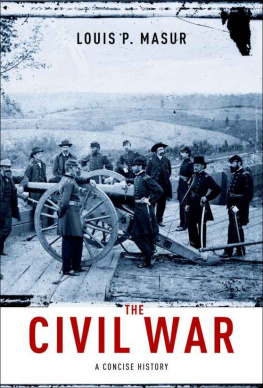
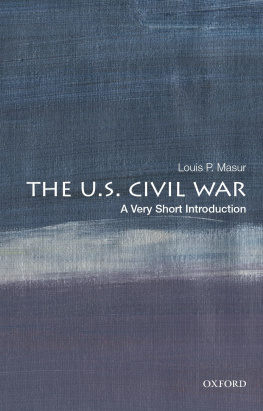
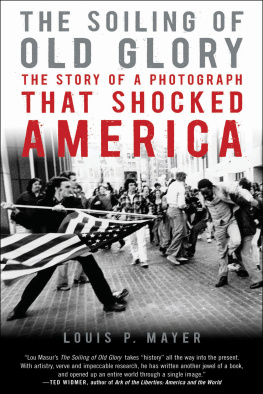
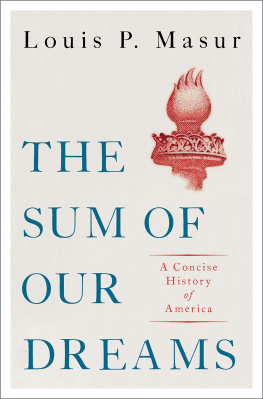

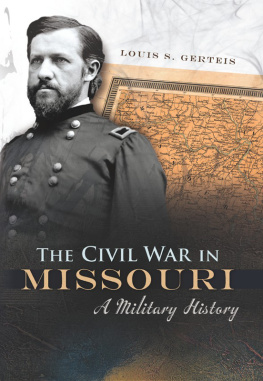
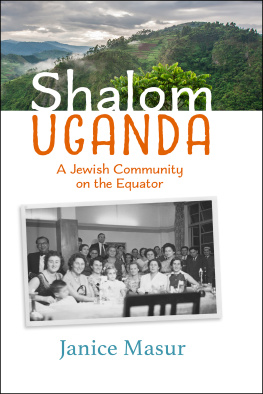
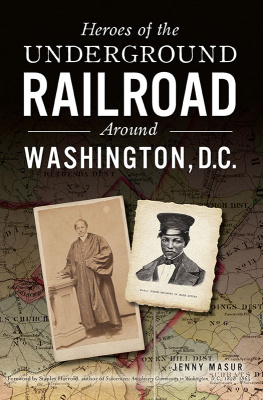
![Louis de Montfort - The Saint Louis de Montfort Collection [7 Books]](/uploads/posts/book/265822/thumbs/louis-de-montfort-the-saint-louis-de-montfort.jpg)
